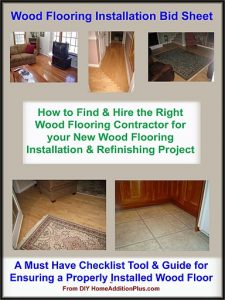Types of Home Flooring and Which Ones Might Be Right for Your Home Remodeling Plans
By Mark J. Donovan
|
|
I’ve had the opportunity to use numerous types of home flooring in my houses over the years. In my younger adult years carpet was the home flooring of choice. It is comfortable, warm on the feet, fairly easy to keep clean, and most important very affordable. However, even with the highest quality carpet flooring and pads, it still only lasts 4 to 6 years in heavily trafficked areas. In addition, carpeting can be rough on people with allergies. Carpet just seems to attract and trap dust into its fibers.
When it came to kitchens and bathrooms linoleum flooring was another popular flooring choice in my earlier home ownership years. Its durable, there are many patterns to choose from, and again its very affordable compared to tiled floors. |
But again, linoleum can wear out after a few years, it can easily cut, and the ends can often curl.
As the years went by and I could afford to spend more money on home flooring I moved up the home flooring ladder and started using wood flooring instead of carpeting in the main living areas and ceramic tile in the kitchens and bathroom.
Laminate flooring’s base layer is constructed out of wood chips and glue. If the base layer gets wet it swells and the floor is pretty much destroyed.
For help on finding a wood flooring installation contractor, see HomeAdditionPlus.com’s Wood Flooring Installation Bid Sheet. It will help ensure that you find and hire the right flooring installation contractor for your wood flooring project. In addition, it will help to ensure that your wood floor installation is completed on time and on budget.
Related Information
- Should Hardwood Flooring go in before the Kitchen Cabinets?
- How to Apply Concrete Floor Coatings
- Solid Wood Flooring versus Laminate Flooring
Additional Flooring Resources from Amazon.com
 |
 |
Free Home Addition Price Quotes with No Obligation!
Fill out our 3-5 minute quick and easy form, and receive a free price quote on a house addition from one of our prescreened and licensed home addition contractors. This process is free and there is no obligation to continue once you receive your house addition price estimate.


